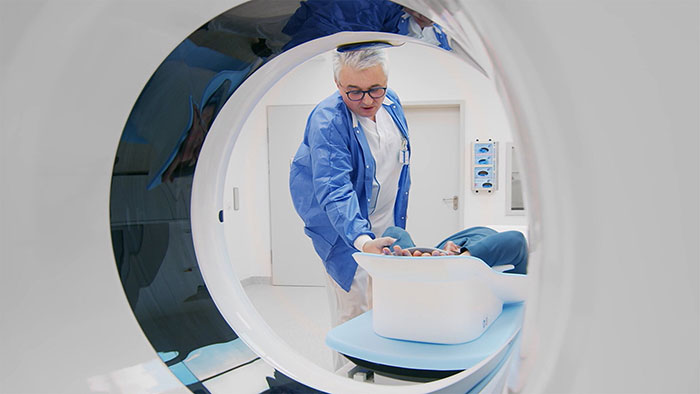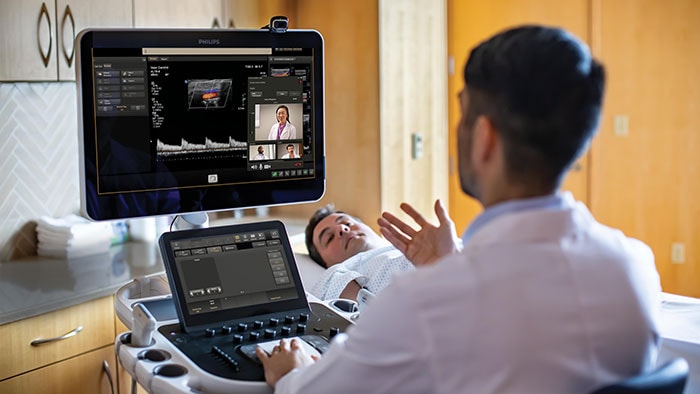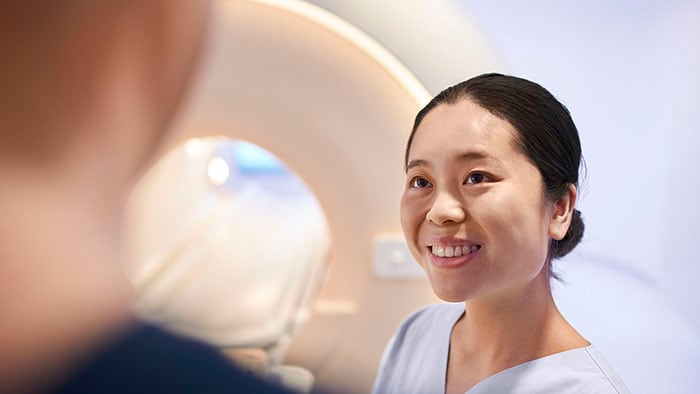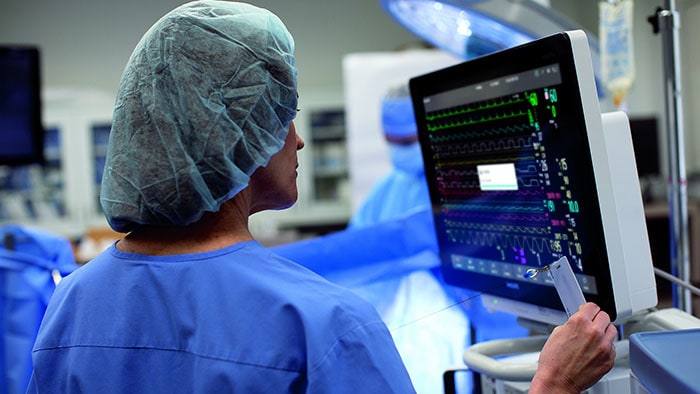Jul 20, 2020
Philips' Second Quarter Results 2020
Philips delivers Q2 sales of EUR 4.4 billion, with 6% comparable sales decrease; income from continuing operations of EUR 213 million, Adjusted EBITA margin of 9.5% and operating cash flow of EUR 558 million
Second-quarter highlights Frans van Houten, CEO: “As the global societal and economic impact of the COVID-19 outbreak intensified in the second quarter of 2020, we continued to focus on our triple duty of care: meeting critical customer needs, safeguarding the health and safety of our employees, and ensuring business continuity. In close collaboration with our suppliers and partners, we have steeply ramped up the production volumes of acute care products and solutions to help diagnose, treat, monitor and manage COVID-19 patients. Our field service engineers have been supporting healthcare providers around the world throughout these testing times. Under the circumstances, I am pleased at the way we have performed and I am grateful and proud of how all our employees have stepped up. In the quarter, Philips' sales declined 6% on a comparable basis and we delivered an Adjusted EBITA margin of 9.5%. Comparable order intake grew a further 27% on the back of double-digit growth in the previous quarter, driven by CT imaging systems, hospital ventilators and patient monitors. As anticipated, COVID-19 caused a steep decrease in consumer demand and postponement of installations in hospitals, as well as elective procedures, resulting in a 19% comparable sales decrease for our Personal Health businesses and a 9% decline for our Diagnosis & Treatment businesses. This was partly offset by a strong 14% comparable sales growth for our Connected Care businesses. We expect to return to growth and improved profitability for the Group in the second half of the year, assuming we can convert our existing order book for the Diagnosis & Treatment and Connected Care businesses, elective procedures normalize, and consumer demand gradually improves. Consequently, for the full year 2020 we continue to aim for a modest comparable sales growth and Adjusted EBITA margin improvement. Looking ahead, our mission is more relevant than ever. Our strategy to transform the delivery of care along the health continuum, leveraging informatics and remote care capabilities, along with our innovative systems and services, has been validated during this crisis. I am convinced that Philips is well positioned to serve the current and future needs of hospitals and health systems.”
Business segment performance The Diagnosis & Treatment businesses recorded a 9% comparable sales decline due to the postponement of installations and elective procedures. Although Diagnostic Imaging sales were in line with Q2 2019, Ultrasound showed a mid-single-digit decrease, and Image-Guided Therapy a double-digit decline. Comparable order intake showed a double-digit decrease. The Adjusted EBITA margin decreased to 8.6%, mainly due to the sales decline. Comparable sales in the Connected Care businesses increased 14%, with double-digit growth in Sleep & Respiratory Care and mid- single-digit growth in Monitoring & Analytics. Comparable order intake more than doubled, driven by strong demand for patient monitors and hospital ventilators. The Adjusted EBITA margin increased to 17.8%, as additional investments to ramp up production were more than offset by operating leverage. The Personal Health businesses recorded a comparable sales decline of 19%, with all businesses declining due to significantly decreased consumer demand. The Adjusted EBITA margin declined to 5.6%, due to the sales decline, partly offset by cost savings. Philips’ ongoing focus on innovation and partnerships resulted in the following key developments in the quarter:
Cost savings In the second quarter, procurement savings amounted to EUR 57 million. Overhead and other productivity programs delivered savings of EUR 51 million. As a result, Philips is on track to deliver over EUR 400 million productivity savings for 2020 and EUR 1.8 billion productivity savings for the Group for the 2017-2020 period. Executive Committee update On July 16, Philips announced the appointment of Deeptha Khanna as the Chief Business Leader of the Personal Health businesses, effective July 20, 2020, and the appointment of Edwin Paalvast as Chief of International Markets, effective August 1, 2020. Ms. Khanna and Mr. Paalvast will become members of Philips’ Executive Committee, reporting to Philips CEO Frans van Houten. Ms. Khanna joins Philips from Johnson & Johnson to lead its Personal Health businesses, which were temporarily led by Frans van Houten. Mr. Paalvast joins Philips from Cisco Systems, and will succeed current Chief of International Markets Henk de Jong, who has been appointed as CEO of Philips’ EUR 2.3 billion Domestic Appliances business, effective August 1, 2020. As announced in January 2020, the Domestic Appliances business is being separated from Philips, a process that is expected to be completed in the third quarter of 2021. Mr. de Jong will continue to report to Frans van Houten and remain a member of the Executive Committee.
Capital allocation Share buyback program At the end of the first quarter of 2020, Philips had completed 50.3% of its EUR 1.5 billion share buyback program for capital reduction purposes that was announced on January 29, 2019. In line with the company’s announcement on March 23, 2020, Philips has executed the second half of the program through individual forward transactions with settlement dates extending into the second half of 2021. Further details can be found here. Share cancellation In June 2020, Philips completed the cancellation of 3,809,675 shares that were acquired as part of the share buyback program mentioned above. Dividend In July 2020, Philips issued a total number of 18,080,198 new common shares for settlement of the 2019 dividend. After deduction of treasury shares, this results in a total number of outstanding shares of 909,395,209, compared to 909,194,188 shares in 2019 following the settlement of the 2018 dividend.
Regulatory update Philips’ Emergency Care and Resuscitation (ECR) business resumed manufacturing and shipping of external defibrillators for the US, following notification from the FDA that the injunction prohibiting those activities has been lifted. Philips continues to comply with the terms of the Consent Decree, which remains in effect, and includes ongoing regulatory compliance monitoring and facility inspections of the ECR business and of Philips’ other patient care businesses by the FDA. In connection with the ECR portfolio, Philips received FDA pre-market approval (PMA) for the HeartStart FR3 [1] and HeartStart FRx [2] automated external defibrillators (AEDs), and their supporting accessories, including batteries and pads. In connection with the COVID-19 pandemic, Philips is working with the FDA’s Emergency Response and Product Evaluation teams to provide them with relevant information, such as Philips’ production ramp-up and availability of acute care products and solutions to combat COVID-19. Philips has obtained authorizations through the FDA’s Emergency Use Authorization (EUA) process for the expanded use of several of its devices during the COVID-19 public health emergency, including for the Philips IntelliVue Patient Monitors MX750/MX850 and its IntelliVue Active Displays AD75/AD85. Moreover, Philips has received FDA 510(k) clearances to market its Biosensor BX100 for early patient deterioration detection in the general ward, and to market a wide range of its ultrasound solutions for the management of COVID-19-related lung and cardiac complications. [1] Model 861388 and Model 861389 [2] Model 861304
Report Second Quarter Results 2020 - Report Presentation Second Quarter Results 2020 - Results Presentation Conference call and audio webcast A conference call with Frans van Houten, CEO, and Abhijit Bhattacharya, CFO, to discuss the results will start at 10:00AM CET, July 20, 2020. A live audio webcast of the conference call will be available through the link below. Q2 2020 – Second quarter and semi-annual results conference call audio webcast More information about Frans van Houten and Abhijit Bhattacharya Click here for Mr. van Houten's CV and images Click here for Mr. Bhattacharya's CV and images
Visit our interactive results hub for more on our financial and sustainability performance over the past quarter, including the latest version of our dynamic Lives Improved world map.
About Royal Philips
Royal Philips (NYSE: PHG, AEX: PHIA) is a leading health technology company focused on improving people's health and enabling better outcomes across the health continuum from healthy living and prevention, to diagnosis, treatment and home care. Philips leverages advanced technology and deep clinical and consumer insights to deliver integrated solutions. Headquartered in the Netherlands, the company is a leader in diagnostic imaging, image-guided therapy, patient monitoring and health informatics, as well as in consumer health and home care. Philips generated 2019 sales of EUR 19.5 billion and employs approximately 81,000 employees with sales and services in more than 100 countries. News about Philips can be found at www.philips.com/newscenter.
Forward-looking statements and other important information
Forward-looking statements Examples of forward-looking statements include: statements made about the strategy; estimates of sales growth; future Adjusted EBITA; future restructuring, acquisition-related and other costs; future developments in Philips’ organic business; and the completion of acquisitions and divestments. By their nature, these statements involve risk and uncertainty because they relate to future events and circumstances and there are many factors that could cause actual results and developments to differ materially from those expressed or implied by these statements. These factors include but are not limited to: changes in industry or market circumstances; economic and political developments; market and supply chain disruptions due to the COVID-19 outbreak; Philips’ increasing focus on health technology; the realization of Philips’ growth ambitions and results in growth geographies; successful completion of divestments such as the divestment of our Domestic Appliances businesses; lack of control over certain joint ventures; integration of acquisitions; securing and maintaining Philips’ intellectual property rights and unauthorized use of third-party intellectual property rights; compliance with quality standards, product safety laws and good manufacturing practices; exposure to IT security breaches, IT disruptions, system changes or failures; supply chain management; ability to create new products and solutions; attracting and retaining personnel; financial impacts from Brexit; compliance with regulatory regimes, including data privacy requirements; governmental investigations and legal proceedings with regard to possible anticompetitive market practices and other matters; business conduct rules and regulations; treasury risks and other financial risks; tax risks; costs of defined-benefit pension plans and other post-retirement plans; reliability of internal controls, financial reporting and management process. As a result, Philips’ actual future results may differ materially from the plans, goals and expectations set forth in such forward-looking statements. For a discussion of factors that could cause future results to differ from such forward-looking statements, see also the Risk management chapter included in the Annual Report 2019. Third-party market share data Statements regarding market share, including those regarding Philips’ competitive position, contained in this document are based on outside sources such as research institutes, industry and dealer panels in combination with management estimates. Where information is not yet available to Philips, those statements may also be based on estimates and projections prepared by outside sources or management. Rankings are based on sales unless otherwise stated. Use of non-IFRS information In presenting and discussing the Philips Group’s financial position, operating results and cash flows, management uses certain non- IFRS financial measures. These non-IFRS financial measures should not be viewed in isolation as alternatives to the equivalent IFRS measure and should be used in conjunction with the most directly comparable IFRS measures. Non-IFRS financial measures do not have standardized meaning under IFRS and therefore may not be comparable to similar measures presented by other issuers. A reconciliation of these non-IFRS measures to the most directly comparable IFRS measures is contained in this document. Further information on non-IFRS measures can be found in the Annual Report 2019. Use of fair value information In presenting the Philips Group’s financial position, fair values are used for the measurement of various items in accordance with the applicable accounting standards. These fair values are based on market prices, where available, and are obtained from sources that are deemed to be reliable. Readers are cautioned that these values are subject to changes over time and are only valid at the balance sheet date. When quoted prices or observable market data are not readily available, fair values are estimated using appropriate valuation models and unobservable inputs. Such fair value estimates require management to make significant assumptions with respect to future developments, which are inherently uncertain and may therefore deviate from actual developments. Critical assumptions used are disclosed in the Annual Report 2019. In certain cases independent valuations are obtained to support management’s determination of fair values. Presentation All amounts are in millions of euros unless otherwise stated. Due to rounding, amounts may not add up precisely to totals provided. All reported data is unaudited. Financial reporting is in accordance with the significant accounting policies as stated in the Annual Report 2019. Certain comparative-period amounts have been reclassified to conform to the current-year presentation. Effective Q1 2020, Philips has simplified its order intake policy by aligning horizons for all modalities to 18 months to revenue, compared to previously used delivery horizons of 6 months for Ultrasound, 12 months for Connected Care and 15 months for Diagnosis & Treatment. At the same time, Philips has aligned order intake for software contracts to the same 18 months to revenue horizon, meaning that only the next 18 months conversion to revenue under the contract is recognized, compared to the full contract values recognized previously. This change eliminates major variances in order intake growth and better reflects expected revenue in the short term from order intake booked in the reporting period. Prior-year comparable order intake amounts have been restated accordingly. This realignment has not resulted in any material additional order intake recognition. Per share calculations have been adjusted retrospectively for all periods presented to reflect the issuance of shares for the share dividend in respect of 2019. Market Abuse Regulation This press release contains inside information within the meaning of Article 7(1) of the EU Market Abuse Regulation.
This document and the related oral presentation, including responses to questions following the presentation, contain certain forward-looking statements with respect to the financial condition, results of operations and business of Philips and certain of the plans and objectives of Philips with respect to these items.
Topics
Contacts

Ben Zwirs
Philips Global Press Office Tel: +31 6 1521 3446
You are about to visit a Philips global content page
Continue
Martijn van der Starre
Philips Global Press Office Tel: +31 6 2847 4617
You are about to visit a Philips global content page
ContinueBusiness Highlights Q2 2020
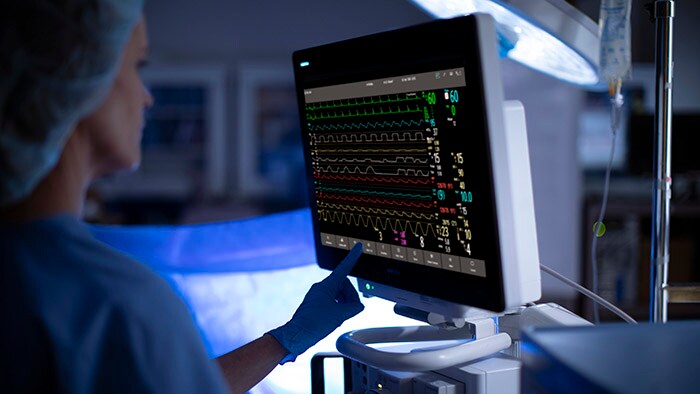
Philips launched several new monitoring solutions for the Intensive Care Unit (ICU), the general ward and the home that feature remote monitoring capabilities and advanced analytics.
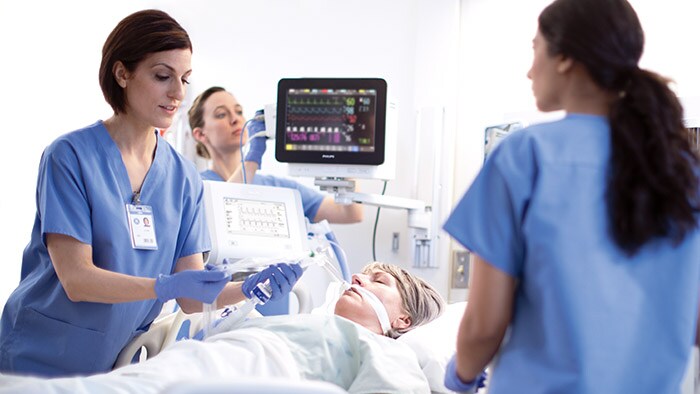
In collaboration with its partners and suppliers, Philips tripled the production of its hospital ventilators in the quarter and is on track to achieve the planned four-fold increase to 4,000 units per week in July 2020, supporting the treatment of COVID-19 patients in the most affected regions around the world.
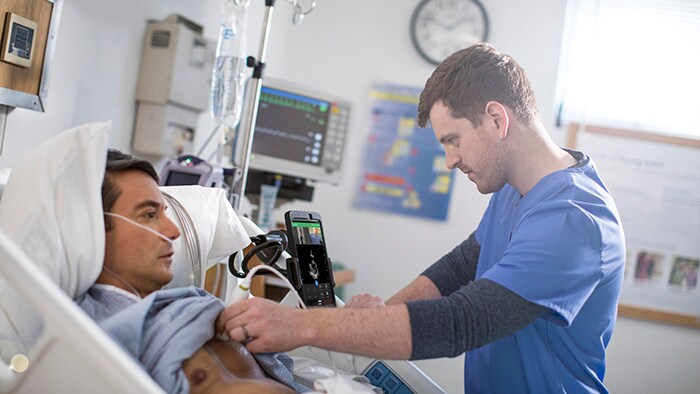
Philips received an industry-first 510(k) clearance from the FDA to market a wide range of its ultrasound solutions.
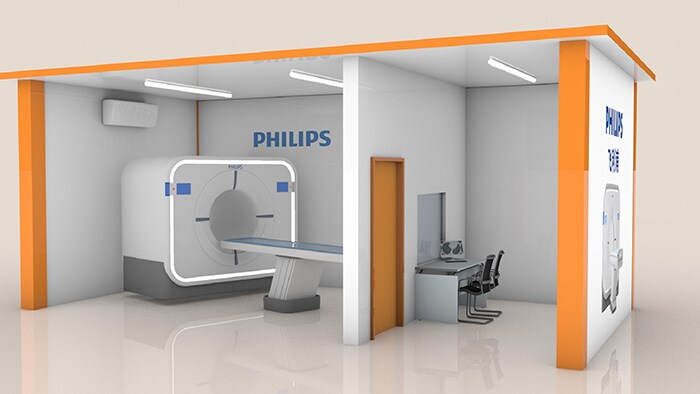
CT and X-Ray cabins to help fight the spread of COVID-19 in the Philippines.
Press releases
Get our press releases by e-mail
You are about to visit a Philips global content page
Continue




